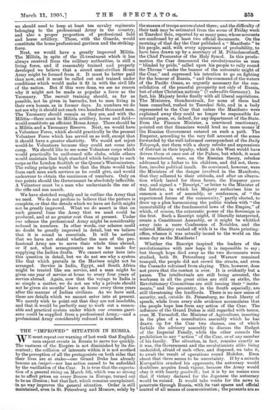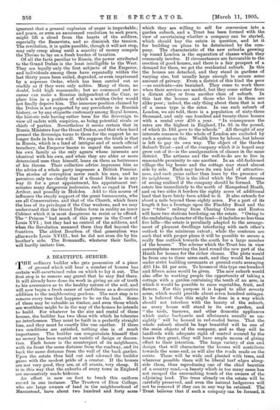W E must repeat our warning of last week that English-
men expect events in Russia to move too quickly. The vastness of the Empire is not diminished by its dis- content; the collision of interests within it is not soothed by the perception of all the protagonists on both sides that their lives are at stake—one Grand Duke has already become an emigre—nor has action ceased to be enfeebled by the vacillation of the Czar. It is true that the expecta- tion of a general rising on March 5th, which was so strong as to affect prices on every Bourse in Europe, turned out to be an illusion; but that fact, which remains unexplained, • in no way improves the general situation. Order is still maintained, even in -St. Petersburg and Moscow, solely by the masses of troops accumulated there; and the difficulty of their task may be estimated from the scene of Friday week at Tsarskoe Selo, reported by so many pens, whose accounts are confirmed by at least two official documents. On the morning of that day the Czar published a, " Manifesto " to his people, said, with every appearance of probability, to have been drawn up by a secretary of M. Pobiedonostzeff, the Chief Procurator of the Holy Synod. In this procla- mation the Czar denounced. the revolutionaries as men " blinded by pride," called upon his people to rally round the Throne " under the banner of the autocratic might of the Czar," and expressed his intention to go on fighting for the honour of Russia, " and the command of the waters of the Pacific Ocean, so urgently necessary for the con- solidation of the peaceful prosperity not only of Russia, but of other Christian nations" (? subaudite Germany). In fact, his Majesty broke finally with all liberal aspirations. The Ministers, thunderstruck, for none of them had been consulted, rushed to Tsarskoe Selo, and in a body represented. to the Czar that unless the Manifesto were explained away they could no longer be responsible for internal peace, or, indeed, for any department of the State. Even the Finance Minister, a convinced reactionary, pointed out that financiers would lend no more money if the Russian Government entered on such a path. The Emperor, according to the very full account of the scene forwarded by the well-informed correspondent of the Daily Telegraph, met them with a sharp rebuke and expressions of distrust in their loyalty, which in the West would have driven them at once out of the Palace, but which, it must be remembered, were, on the Russian theory, rebukes addressed by a father to his children, and did not, there-, fore, involve political insult. So convinced, however, were the Ministers of the danger involved in the Manifesto, that they adhered to their attitude, and after an alterca- tion which lasted. for three hours, the Emperor gave way, and signed. a " Rescript," or letter to the Minister of the Interior, in which his Majesty authorises him to summon a sort of assembly, or conference, of " the experienced forces of the community," partly elected, to draw up a plan harmonising the public wishes with " the immutability of the fundamental laws of the Empire," of which, of course, the autocratic power of the Sovereign is the first. Such a Rescript might, if liberally interpreted, create a Constituent Assembly, or it might be whittled away into a mere Conference of Notables, and the relieved Ministry rushed off with it to the State printing- office, whence it was actually issued to the world on the same day as the Manifesto !
Whether the Rescript inspired the leaders of the ' revolutionaries with new hope it is impossible to say ; but though hope died. away as the two documents were studied, both St. Petersburg and Warsaw remained tranquil, the people did not crowd the streets, and even the Cossacks refrained from slaying. This, however, does not prove .that the contest is over. It is evidently but a pause. The intellectuals are still being arrested, the workmen in all the great cities are still on strike, the Revolutionary Committees are still issuing their " incite- ments," and the peasantry, in the South especially, are still threatening the landlords. There is no new sense of security, and, outside St. Petersburg, no fresh liberty of speech, while from every side evidence accumulates that the people hope less from any action of the Czar. The i influence of the Grand Dukes is still regarded. with terror, even M. Yermoloff, the Minister of Agriculture, inserting in the plan of a consultative assembly which he has drawn up for the Czar two clauses, one of which forbids the advisory assembly to discuss the Budget of the Imperial Family, while the other extends the prohibition to any " action " of the Czar, or of any member of his family.. The situation, in fact, remains exactly as it was, the Government and the revolutionists alike being undecided, afraid. of each other, and disposed, we take it, to await the result of operations round Mukden. Even about that there seems to be, uncertainty. If by a miracle Kuropatkin crushed his opponents, the autocracy would doubtless acquire fresh vigour, because the Army would obey it with hearty goodwill ; but it is by no means sure that if victory declared for the Japanese the autocracy would be ruined. It would take weeks for the news to penetrate through Russia, with its vast s control of all means of communication ; ge3jnd official peasants are so ignorant that a general explosion of anger is improbable; and peace, or even an announced resolution to seek peace, might lift a cloud from the hearts of the soldiers, especially the Reservists, and so diminish the tension. The revolution, it is quite possible, though it will not stop, may only creep along until a scarcity of money compels the Throne to lay on a fresh burden of taxation. Of all the facts peculiar to Russia, the power attributed to the Grand Dukes is the least intelligible to the West. They are legally only the first subjects of the Emperor, and individuals among them have repeatedly within the last thirty years been exiled, degraded, or even imprisoned by a supreme Order, which has been carried out as readily as if they were only nobles. Many of them, no doubt, hold high commands ; but no command and no career can make a Russian independent of the Czar, or place him in a position of which a written Order would not finally deprive him. The immense position claimed by the Dukes is not supported by any precedents in Russian history, or by any etiquette customary among Royal houses, the historic rule having rather been for the Sovereign to view all cadets with suspicion, as being potential rivals or chiefs of parties. Nevertheless it seems certain that in Russia Ministers fear the Grand Dukes, and that when hard pressed the Sovereign turns to them for the support he no longer finds in his own will. We suppose the truth is that in Russia, which is a. land of intrigue and of much official treachery, the Emperor learns to regard the members of his own family as the only agents whose interests are identical with his own, and when they are abler or more determined men than himself, leans on them as buttresses of his throne. Their collective advice impresses him as the advice of a whole party impresses a British Premier. The stories of corruption never reach his ears, and he perceives only too clearly that if a Grand Duke is in any way fit for a great appointment, his appointment ter- minates many dangerous jealousies, such as raged in Port Arthur, and possibly in Mukden. Add to this source of influence the steady support of the great bureaucrats, who are all Conservatives, and that of the Church, which fears the loss of its privileges if the Czar weakens, and we may understand that the Grand Dukes form in reality an inner Cabinet which it is most dangerous to resist or to offend. The " Princes " had much of this power in the Court of Louis XVI. ; but they had no control of the soldiers, and when the Revolution menaced them they fled beyond the frontiers. The ablest Bourbon of that generation was afterwards Louis XVIII., but he did not even die by his brother's side. The Romanoffs, whatever their faults, will hardly imitate him.











































 Previous page
Previous page